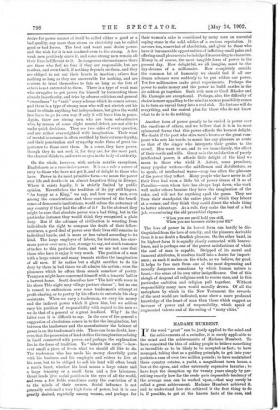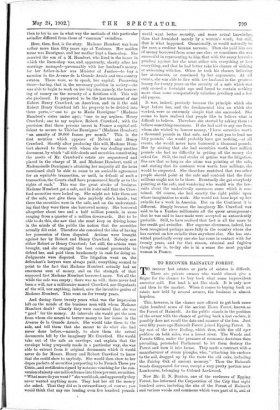MADAME HUMBERT.
IF the word " great " can be justly applied to the mind and the achievements of a swindler, it is surely applicable to the mind and the achievements of Madame Humbert. To have conceived the idea of asking people to believe something so incredible as to be likely to be accepted as fact; to have managed, taking that as a guiding principle, to get into your pockets a sum of over two million pounds; to have maintained three country estates, a yacht, a magnificent town house, a box at the opera, and other extremely expensive luxuries ; to have kept the deception up for twenty years simply by per- ceiving exactly how far the credo pia im,possibile tendency of the average man can be worked upon,—that may surely be called a great achievement. Madame Humbert achieved it, and to understand how she achieved it the first thing to do is, if possible, to get at the known facts of the case, and
then to try to see in what way the methods of this particular swindler differed from those of "common" swindlers.
Here, then, first, is the story. Madame Humbert was born rather more than fifty years ago at Toulouse. Her maiden name was Daurignac, and her mother kept a linen-shop. She married the son of a M. Humbert, who lived in the house in -which the linen-shop was, and, apparently, shortly after her marriage managed—presumably with her husband's money, for her father-in-law was Minister of Justice—to buy a mansion in the Avenue de In Grande Armi..e and two country estates. These were, so to speak, her capital. Possessing these—having, that is, the necessary position in society—she was able to begin to work on her big idea, namely, the borrow- ing of money on the security of a fictitious will. This will she produced. It purported to be the last testament of one Robert Henry Crawford, an American, and in it the said Robert Henry Crawford left his property to be divided into three parts,—" one to go to Marie Daurignac" (Madame Humbert's sister under age); "one to my nephew, Henry Crawford ; one to my nephew, Robert Crawford ; with the provision that these persons invest in France a capital suf- ficient to secure to Therese Daurignac" (Madame Humbert) "an annuity of 30,000 francs per month." This is the first mention which appears of Robert and Henry Crawford. Shortly after producing this will, Madame Hum- bert showed to those with whom she was dealing another document, by which "all title-deeds and securities constituting the assets of Mr. Crawford's estate are sequestered and placed in the charge of M. and Madame Humbert, until at Mademoiselle Daurignac's attaining her majority all the heirs mentioned shall be able to come to an amicable agreement for an equitable transaction, or until, in default of such a transaction, the Courts shall have pronounced finally as to the rights of each." This was the great stroke of business. Madame Humbert got a safe, and in it she said that the Craw- ford securities were locked up. She might not take them out of the safe, nor give them into anybody else's hands ; but there the securities were in the safe, and on the understand- ing that they were there she borrowed money. She borrowed altogether about two and a half million pounds, in sums ranging from a quarter of a million downwards. But to be able to do this, she saw that she must keep on driving home in the minds of the public the notion that the securities actually did exist. Therefore she conceived the idea of having her possession of them disputed. Actions were brought against her by Robert and Henry Crawford. Nobody saw either Robert or Henry Crawford ; but still, the actions were brought, and she engaged the beat counsel procurable to defend her, and paid them handsomely in cash for doing so. Judgments were disputed. The litigation went on, the defendant's lawyers were always paid; everything seemed to point to the fact that Madame Humbert actually had an enormous sum of money, and on the strength of that supposed fact Madame Humbert borrowed more. Yet all the while the safe was empty ; there was no will; there never had been a will, nor a millionaire named Crawford, nor disputants of the will, nor anything, indeed, save the inventive genius of Madame Humbert. This went on for twenty years.
And during those twenty years what was the impression left on the minds of the business men with whom Madame Humbert dealt? Clearly they were convinced that she was "good" for the money. At intervals she would get the men from whom she meant to borrow money to her house in the Avenue de in Grande Armee. She would take them to the safe, and tell them that she meant to do what she had never done before,—namely, to show them the actual documents left by the imaginary Mr. Crawford. She would take out of the safe an envelope, and explain that the envelope being purposely made in a particular way, she was able to extract from it original documents which it would never do for Messrs. Hemy and Robert Crawford to know that she could show to anybody. She would then show to her dupes packets of securities purporting to be French Three per Cents., and certificates signed by notaries vouching for the con- version of ninety-one million francs into three per cent. securities. "What more do you want? "she would ask, and apparently they never wanted anything more. They lent her all the money she asked. That they did so is extraordinary, of course ; you would think that any one lending even five hundred pounds would want better security, and more actual knowledge, than that furnished merely by a woman's word ; but still, that is what happened. Occasionally, as would naturally be the case, a creditor became nervous. Then she paid him out of money borrowed from some one else; or sometimes she was successful in representing to him that with the many lawsuits pending against her she must either win everything or less everything, and that he had better take his chance of sinking or swimming with her. Often he took his chance, believing her statements, or convinced by her arguments. At all events, she was able to live with her husband in the greatest lustily for twenty years on the security of a safe which was only opened a fortnight ago and found to contain nothing more than some comparatively valueless jewellery and a few old papers.
It was, indeed, precisely because the principle which she kept before her, and the fundamental idea on which she worked, were so extremely simple that she succeeded. She seems to have realised that people like to believe what is difficult to believe. Therefore she started by asking them to believe something enormous. If she had said to any one front whom she wished to borrow money, I have securities worth a thousand pounds in that safe, and I want you to lend me fifty pounds,' she would probably have got nothing,—at all events, she would never have borrowed a thousand pounds. But by stating that she had securities worth four million pounds she had no difficulty in getting all the money she asked for. Still, the real stroke of genius was the litigation. She saw that so long as she alone was pointing at the safe, and stating that its contents were worth four millions, she would be suspected. She therefore contrived that two other people should point at the safe and contend that the four millions ought not to be there. Eventually she got everybody pointing at the safe, and wondering who would win the law- suits about the undoubtedly enormous sums which it con- tained. Of course, she had exactly the right public upon whose imagination to work. She would not have kept up her swindle for a week in America. But on the Continent it is different. Simply because the imaginary Mr. Crawford was said to be a Yankee millionaire all the queer arrangements that he was said to have made were accepted as antecedently probable. Still, to have realised that fact is all the more to her credit qua' swindler. Her supreme cleverness, indeed, has been recognised perhaps more fully in the country where she has carried on her swindle than anywhere else. She has out- witted practically every one she has come in contact with for twenty years, and for that reason, criminal and fugitive though she is, to-day she is in a sense the most popular woman in France.







































 Previous page
Previous page